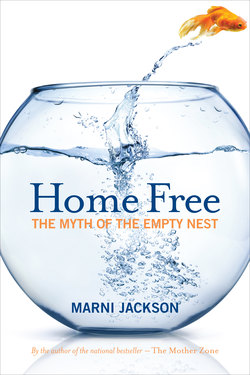Читать книгу Home Free - Marni Jackson - Страница 14
На сайте Литреса книга снята с продажи.
ОглавлениеHis Version
AMONTH OR TWO after I got back to Toronto, Casey flew home from Las Vegas with his bike in a box. His hair was wild and his eyes were very blue. Whiffs of the ocean and the desert came off him. Somewhere on the road, in a pay phone, he had applied and been accepted for a job at a summer camp in Maine, leading canoe trips. More outside. More adventure.
And he thought he might go back to university in the fall after all. Maybe change his minor to environmental studies, cut back his course load a little.
That sounds good to us,we said.
There were a few weeks left before he had to be in Maine, so he stayed with us. Sometimes he would stay out with friends ’til 3 or 4 a.m., keeping Montreal hours, then biking home. I am a light sleeper. On those nights, I fell into a certain routine.
We go to bed shortly after midnight as usual. Then, around two,my eyes pop open. I can tell by the slant of the light in the hall that his bedroom door is still open. Not home yet. Never mind! Think of all the nights he’s been somewhere else, in Tucson or Tijuana or Montreal and you’re not around to worry about him showing up, I chastise myself. He’s in his twenties now, I remind myself, not a little boy lost in the mall; he could be driving a tank in Afghanistan. God, imagine that. (I do.)
Brian sleeps on, unperturbed, beside me. Then I think about a friend of ours, a psychotherapist with a son Casey’s age still living at home; she told me that she can’t help it, she stays awake ’til he gets home too. It’s like we’re soldiers with post-traumatic syndrome, who get triggered by harmless but familiar situations.
Three a.m. Was he wearing his helmet? I feel ridiculous, mothering away in the dark, for no good reason. Should I avail myself of the little blue crumbs of Ativan in the drawer by the bed? No, let’s wait a bit. Maybe the paperman will drive by earlier than usual— his muffler is shot so I know that sound too—and I can read the Globe.
I don’t think I have the telephone numbers of any of his Toronto friends. Alex, Tom, and Rhys. Rhys who?
Then I hear the chunnng of the wrought-iron fence closing and the front door unclasping. The delicate tick of the road bike being wheeled in. The fridge door opens, and closes, followed by his cautious steps on the stairs, adult and thoughtful.
The hall light goes off.
Now I can sleep.
Two years after our simultaneous journeys, I began to put together some notes for this book. But the chronology of events had faded, so I asked Casey to map out his itinerary for me. Also, had he thought more about why he wanted to take off and travel in the first place?
This is part of what he wrote back:
“Hitting the road was a bit of a shot in the dark. I knew I wanted a change and a new experience, but I wasn’t sure what I was looking for. Part of it was a rejection of ‘the establishment,’ whatever that was. I’ve always had a chip on my shoulder about schooling and jobs and institutions. So I decided to get away and do something that wasn’t tied to any of these things. The freedom was exhilarating. Every bus stop and overpass and skyline seemed unbelievably real and vivid.
“One thing I noticed is that the farther from home you get, the more your differences stick out. I was a bit of an odd character in New Mexico but I really stuck out in Guatemala. I realized I would always be having the experience of a gringo, no matter how far I travelled. I began to notice how I must have appeared to people in the middle of their own regular lives. I was a dirty, aimless white kid hundreds of miles away from his family and friends. I was going nowhere in particular, for no apparent reason. In Mexico, especially, people often couldn’t understand why anyone would want to be away from their home and family.
“In Toronto, each adult person is, more or less, on their own. Not alone all the time, but when it comes down to the wire it’s sort of every man for himself. You go to school to succeed, and to make a life for yourself. People work at jobs, advance their careers, buy their own things, and support their own families. If you’re successful, it’s your achievement. If you fail, it’s your problem. The individual is the basic unit of social interaction. This puts a lot of pressure on the individual to succeed and to be an autonomous, fully functional member of society.
“In Latin America, from what I could see, the family was the basic unit of life, not the individual. People seemed to identify and understand themselves primarily according to their family, extended family, and community. It’s hard to say this and not sound clichéd, but family and community seemed to mean something totally different in Mexico than it did in my world.
“I don’t want to sound like a sociology textbook, so let me tell you why this is relevant to me. I was on a journey, spending time and money. I was choosing to go out into the world and find something. I was obviously doing something, but what the hell was it?
